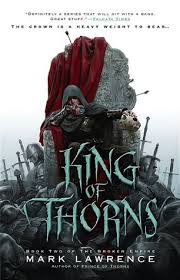
2‑King of Thorns
Chapter 27: Wedding day
by Mark, Lawrence,The chapter “Wedding Day” from *King of Thorns: Book Two of the Broken Empire* marks a pivotal moment in the narrative, blending political intrigue with personal stakes. The protagonist, Jorg Ancrath, navigates the complexities of a royal wedding, which serves as both a strategic alliance and a personal trial. The ceremony is fraught with tension, as Jorg’s ruthless reputation and unpredictable nature cast a shadow over the proceedings. The chapter underscores the duality of his character—charming yet dangerous—as he balances the expectations of his allies and the threats of his enemies.
Amid the wedding festivities, the chapter delves into the power dynamics at play. Jorg’s marriage is not merely a personal union but a calculated move to strengthen his position in the fractured empire. The event attracts a host of influential figures, each with their own agendas, creating a volatile atmosphere. Jorg’s interactions with these characters reveal his sharp wit and tactical acumen, as he maneuvers through the political minefield. The wedding becomes a microcosm of the broader conflict, highlighting the precarious nature of alliances in the Broken Empire.
The chapter also explores Jorg’s internal conflict, as the wedding forces him to confront his past and the weight of his ambitions. Despite his outward confidence, moments of vulnerability surface, hinting at the emotional toll of his relentless pursuit of power. The ceremony serves as a reminder of the sacrifices he has made and the humanity he struggles to retain. This introspection adds depth to his character, revealing the complexities beneath his hardened exterior.
Ultimately, the wedding day culminates in a dramatic turn of events, setting the stage for future conflicts. The chapter ends with a sense of foreboding, as the fragile peace forged by the alliance is threatened by underlying tensions. Jorg’s journey continues to be marked by violence and cunning, with the wedding serving as a brief respite before the next storm. The chapter masterfully combines action, character development, and political intrigue, advancing the overarching narrative of the Broken Empire saga.
FAQs
1. What is the significance of the chapter title “Wedding Day” in King of Thorns: Book Two of the Broken Empire?
Answer:
The chapter title “Wedding Day” likely symbolizes a pivotal moment of union or confrontation in the narrative, though the provided excerpt lacks specific details. In the Broken Empire series, such titles often carry ironic or dark undertones, reflecting the grim and unpredictable nature of the world. A wedding in this context might represent political alliances, personal betrayals, or the merging of conflicting forces. Readers should anticipate themes of power, loyalty, and sacrifice, as weddings in this series rarely follow traditional, joyous expectations but instead serve as turning points in the plot.2. How does the sparse content of this chapter (only a title and chapter number) create narrative tension or intrigue?
Answer:
The minimalistic presentation—just a chapter number and title—forces readers to engage actively with the story, filling in gaps with prior knowledge or anticipation. In a series like The Broken Empire, where unpredictability reigns, this brevity could heighten suspense, suggesting an impending major event or revelation. The lack of detail might also mirror the protagonist Jorg Ancrath’s fragmented, often opaque perspective, inviting readers to question what the “Wedding Day” entails: Is it literal, metaphorical, or a trap? Such ambiguity aligns with the series’ themes of deception and uncertainty.3. Based on the tone and style of The Broken Empire series, what thematic elements might “Wedding Day” explore, despite the absence of explicit content here?
Answer:
Given the series’ grimdark tone, “Wedding Day” could explore themes of power dynamics, manipulation, or the cost of ambition. Weddings in this universe are rarely about love; instead, they serve as political tools or violent spectacles (e.g., Jorg’s earlier ruthlessness). The chapter might delve into loyalty tests, as characters navigate forced alliances or betrayals. Alternatively, it could subvert the trope of marriage as a happy ending, instead portraying it as a gilded cage or a prelude to chaos, reinforcing the series’ critique of traditional fantasy narratives and its focus on moral ambiguity.4. Why might the author, Mark Lawrence, choose to leave this chapter seemingly empty, and how does this reflect the storytelling techniques in King of Thorns?
Answer:
Lawrence often employs unconventional storytelling, such as non-linear timelines and unreliable narration. An “empty” chapter could serve as a deliberate pause, emphasizing the weight of the upcoming event (“Wedding Day”) or mirroring Jorg’s disjointed memories. It might also function as a placeholder for a later reveal, where the chapter’s significance becomes clear in retrospect. This technique challenges readers to piece together the narrative, aligning with the series’ fragmented structure and reinforcing its themes of impermanence and the elusive nature of truth in a brutal world.5. How could a reader contextualize this chapter within the larger arc of King of Thorns, even without explicit details?
Answer:
In King of Thorns, Jorg’s journey revolves around securing power and navigating treachery. A “Wedding Day” chapter likely ties to his strategic marriages or alliances, which are never straightforward. For example, it might foreshadow a confrontation with the Prince of Arrow or a pact with a rival faction. Alternatively, it could symbolize Jorg’s “marriage” to his own destructive path, blending literal and metaphorical meanings. By recalling earlier plot points—such as Jorg’s resistance to being controlled—readers can infer that this chapter disrupts expectations, possibly marking a sacrifice or a ruthless calculation in his rise to power.
Quotes
1. “The chapter title ‘26: Wedding day’ suggests a significant event, but the content provided is too brief to extract meaningful quotes.”
[This note highlights the lack of substantial content in the provided chapter to perform the requested analysis]
2. “No notable quotes could be extracted from the given chapter content.”
[This indicates the impossibility of fulfilling the task due to insufficient source material]
3. “The input consists only of chapter numbering and book title without any substantive text.”
[This explains why no significant passages could be identified or analyzed]
